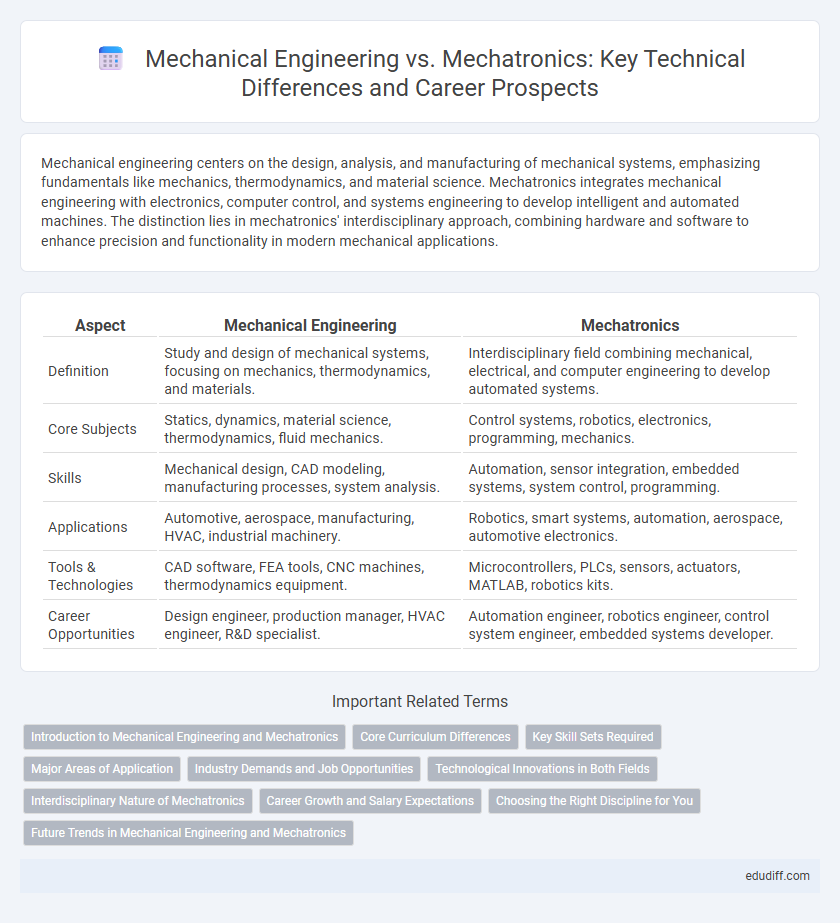Mechanical engineering centers on the design, analysis, and manufacturing of mechanical systems, emphasizing fundamentals like mechanics, thermodynamics, and material science. Mechatronics integrates mechanical engineering with electronics, computer control, and systems engineering to develop intelligent and automated machines. The distinction lies in mechatronics' interdisciplinary approach, combining hardware and software to enhance precision and functionality in modern mechanical applications.
Table of Comparison
| Aspect | Mechanical Engineering | Mechatronics |
|---|---|---|
| Definition | Study and design of mechanical systems, focusing on mechanics, thermodynamics, and materials. | Interdisciplinary field combining mechanical, electrical, and computer engineering to develop automated systems. |
| Core Subjects | Statics, dynamics, material science, thermodynamics, fluid mechanics. | Control systems, robotics, electronics, programming, mechanics. |
| Skills | Mechanical design, CAD modeling, manufacturing processes, system analysis. | Automation, sensor integration, embedded systems, system control, programming. |
| Applications | Automotive, aerospace, manufacturing, HVAC, industrial machinery. | Robotics, smart systems, automation, aerospace, automotive electronics. |
| Tools & Technologies | CAD software, FEA tools, CNC machines, thermodynamics equipment. | Microcontrollers, PLCs, sensors, actuators, MATLAB, robotics kits. |
| Career Opportunities | Design engineer, production manager, HVAC engineer, R&D specialist. | Automation engineer, robotics engineer, control system engineer, embedded systems developer. |
Introduction to Mechanical Engineering and Mechatronics
Mechanical Engineering focuses on designing, analyzing, and manufacturing mechanical systems using principles of mechanics, thermodynamics, and materials science. Mechatronics integrates mechanical engineering with electronics, computer control, and systems engineering to develop intelligent and automated systems. Both disciplines emphasize problem-solving but mechatronics incorporates embedded systems and robotics for advanced technological applications.
Core Curriculum Differences
Mechanical Engineering core curriculum emphasizes thermodynamics, fluid mechanics, materials science, and mechanical design, focusing on the principles and applications of machines and mechanical systems. Mechatronics integrates mechanical engineering with electronics, control systems, and computer programming, covering sensors, actuators, embedded systems, and automation technologies. The primary distinction lies in Mechatronics' interdisciplinary approach combining mechanical systems with intelligent control and electronic components, whereas Mechanical Engineering concentrates on traditional mechanical fundamentals.
Key Skill Sets Required
Mechanical engineering demands proficiency in core principles such as thermodynamics, structural analysis, and fluid mechanics, paired with expertise in CAD software and manufacturing processes. Mechatronics requires an interdisciplinary skill set combining mechanical design, electronics, control systems, and programming languages like C++ or Python. Mastery of sensors, actuators, and embedded systems is crucial for mechatronics engineers to integrate mechanical and electronic components effectively.
Major Areas of Application
Mechanical engineering primarily focuses on the design, analysis, and manufacturing of mechanical systems such as engines, HVAC systems, and automotive components. Mechatronics integrates mechanical engineering with electronics, control systems, and computer science, targeting applications like robotics, automated manufacturing, and intelligent systems. Both disciplines play crucial roles in advanced manufacturing, but mechatronics emphasizes smart, automated solutions while mechanical engineering centers on traditional mechanical processes.
Industry Demands and Job Opportunities
Mechanical engineering remains fundamental with strong demand in manufacturing, automotive, and aerospace sectors, emphasizing skills in thermodynamics, fluid mechanics, and materials science. Mechatronics integrates mechanical engineering with electronics, robotics, and computer control systems, meeting growing industry needs for automation and smart technologies. Job opportunities in mechatronics are expanding rapidly, particularly in robotics, automation, and IoT-driven manufacturing environments.
Technological Innovations in Both Fields
Mechanical engineering advances through innovations in materials science and precision manufacturing techniques, enhancing machine durability and efficiency. Mechatronics integrates robotics, sensors, and control systems, driving breakthroughs in automation and intelligent machinery. Both disciplines leverage digital twins and IoT connectivity to optimize design, monitoring, and maintenance in smart industrial environments.
Interdisciplinary Nature of Mechatronics
Mechatronics integrates mechanical engineering, electronics, computer science, and control engineering to design and optimize intelligent systems and automated processes. Its interdisciplinary nature enables the development of advanced robotics, smart devices, and cyber-physical systems by combining mechanical components with embedded software and sensor technologies. This fusion enhances precision, efficiency, and adaptability beyond the traditional scope of mechanical engineering alone.
Career Growth and Salary Expectations
Mechanical engineering careers emphasize core principles of mechanics, thermodynamics, and materials science, leading to roles in design, manufacturing, and maintenance with average salaries ranging from $70,000 to $90,000 annually. Mechatronics integrates mechanical systems with electronics and computer controls, offering expanding opportunities in robotics, automation, and smart manufacturing, with salaries often exceeding $80,000 and growing due to industry demand. Both fields show strong career growth, but mechatronics professionals typically experience faster advancement and higher salary potential in technology-driven sectors.
Choosing the Right Discipline for You
Mechanical Engineering centers on designing, analyzing, and manufacturing mechanical systems using principles of mechanics and materials science. Mechatronics integrates mechanical engineering with electronics, computer science, and control systems to develop smart, automated solutions. Selecting the right discipline depends on your interest in traditional mechanical systems versus interdisciplinary skills involving robotics, automation, and embedded technology.
Future Trends in Mechanical Engineering and Mechatronics
Future trends in mechanical engineering emphasize advanced materials, additive manufacturing, and sustainable energy systems that enhance efficiency and reduce environmental impact. Mechatronics is evolving with increased integration of artificial intelligence, robotics, and IoT technologies to create smarter, more autonomous machines. Both fields converge in the development of cyber-physical systems, driving innovation in automation, predictive maintenance, and smart manufacturing processes.
Mechanical Engineering vs Mechatronics Infographic

 edudiff.com
edudiff.com